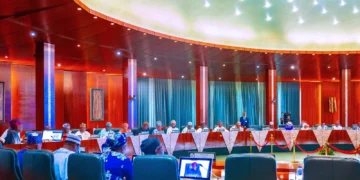There’s a saying in the north: when a man keeps repainting his house but never fixes the leaking roof, it’s only a matter of time before the paint starts to peel again.
That’s the picture I see in Abuja these days—plenty of political painting, less roofing.
Last week offered three snapshots of the same country, each wearing a different disguise. In Enugu, Vice President Kashim Shettima presided over the grand reception of Governor Peter Mbah and his entire cabinet into the All Progressives Congress (APC).
In Abuja. A day before the VP declared that Nigeria was unlocking over $410 billion in renewable energy investments.
And barely twenty-four hours earlier, he warned that flood-prone communities must be empowered to manage their own safety.
Three events. Three speeches. One question: are we fixing the roof or repainting the house?
Let’s start with the defections.
Governor Mbah’s move to the APC was choreographed like a homecoming. Michael Okpara Square looked like a political carnival—banners, praise songs, speeches about “bridges built” and “brooms unhidden.” The Vice President, speaking for President Tinubu, described the defections as proof that the APC has become “a political home where ideas find expression, where ambitions find direction, and where patriotism finds partnership.”
Nice poetry. But I’ve covered Nigerian politics long enough to know defections are rarely about poetry. They’re about power and protection.
Every election cycle, politicians migrate the way herds move during dry season—toward where the grass is greener. Mbah is not the first, and he won’t be the last.
From Zamfara to Cross River, governors have changed jerseys mid-match and called it “alignment with national vision.” What they mean is “alignment with federal contracts.”
Now, Shettima’s speech in Enugu was vintage northern pragmatism. He said, “It is not the duty of the governing party to fix the house of the opposition.” Fair. But he also reminded Mbah that he’s now the leader of the party in Enugu, responsible for rebuilding its foundation. That’s a heavy assignment.
The APC is becoming the only political supermarket in town. Everybody wants shelf space. The question is: what happens when the store runs out of stock?
The problem isn’t the influx; it’s the motive. Most of these defectors are not bringing fresh ideas, just old habits in new wrappers. Nigeria doesn’t suffer from a shortage of parties—it suffers from a shortage of principles.
Now to the Abuja forum, where the same Vice President spoke with a different vocabulary—dollars, gigawatts, and green energy.
He said Nigeria’s energy transition could unlock $410 billion between now and 2060, with $23 billion needed immediately to connect the millions still living in darkness.
Needless to say, Nigeria desperately needs a renewable-energy revolution. We’ve been promising electricity since the days of NEPA. Yet, in 2025, about 80 million Nigerians still live without steady power. That’s nearly the population of Germany.
If the government can genuinely pull in $400 million in new manufacturing investments—as Shettima announced, targeting solar panels, batteries, and smart meters—it would be a serious start.
What caught my attention, though, wasn’t the figure—it was the phrase “Nigeria First industrial strategy.”
Finally, a line that makes sense. If the government can anchor renewable energy production within Nigeria—solar assembly in Lagos, battery recycling in Ogun, power storage plants in Jigawa—that’s the kind of local content that creates jobs. But this will need more than MoUs and photo-ops. It will need laws that protect investors, stable tariffs, and ministries that don’t kill projects with bureaucracy.
The VP said Tinubu’s administration is building a self-sustaining renewable market. Good.
Then came the disaster management conference—the most grounded of the three events.
Shettima’s tone here was less political, more human. He said no amount of preparedness will yield results if communities are not empowered to take charge of their safety.
That line should be printed on every government office wall. Because when floods come, it’s not the minister’s house that gets submerged—it’s the farmer’s hut.
Nigeria loses an average of $6 billion annually to flood damage, according to the National Emergency Management Agency (NEMA). In 2022 alone, floods killed more than 600 people and displaced over 1.4 million. Yet, every year we repeat the same ritual: warnings, committees, condolences.
Shettima’s proposal to strengthen local emergency units with training and technology makes sense. You can’t manage a flood from Abuja; you manage it from the riverbank.
But again, the same question: will it be sustained after the TV cameras leave?
Because we’ve seen this movie. There’ll be policy statements, new frameworks, and maybe a National Disaster Risk Financing document. Next year, we’ll be back counting casualties in Kogi, Bayelsa, and Adamawa.
I’ve always argued that resilience is not built by speeches—it’s built by systems. Drainage maintenance, early-warning infrastructure, and local response funds. You can’t claim to be “funding resilience” when primary schools in flood zones still sit on the same low ground as last year.
The Vice President said the government wants to move “from reacting to crises to preventing them.” Good ambition.
If you look closely, these three events tell one long story about Nigeria’s governance pattern.
We love the theatre of progress—the stage lights, the applause, the rhetoric. We’re less consistent with the follow-up.
The Enugu rally celebrated political consolidation. The Abuja forum sold an economic vision. The disaster event spoke the language of compassion. Together, they paint the portrait of a government trying to prove its its capacity on all fronts.
President Tinubu deserves credit for giving his Vice President a visible, policy-heavy portfolio. Shettima is clearly becoming the administration’s chief explainer—part salesman, part realist. And to his credit, he has been playing the roles well.
The renewable-energy plan and the disaster-management agenda can succeed only if they are insulated from the same politics that drive defections.
Because nothing kills reform faster than party reward systems. You can’t preach green energy in the morning and share diesel contracts at night. You can’t talk flood prevention while approving estate permits on floodplains.
Nigeria’s biggest problem has never been a shortage of ideas—it’s consistency. Every new government behaves like a reset button, discarding the last administration’s plans even when they worked.
If we treated national development the way politicians treat elections—with the same urgency, funding, and propaganda—our roads would shine like campaign billboards.
At the end of the day, governance is like farming—you can talk all you want about seedlings and irrigation, but if the harvest is poor, the people will know.
The APC has gathered the biggest political force in Africa. It’s time to show that it can grow more than politicians.





